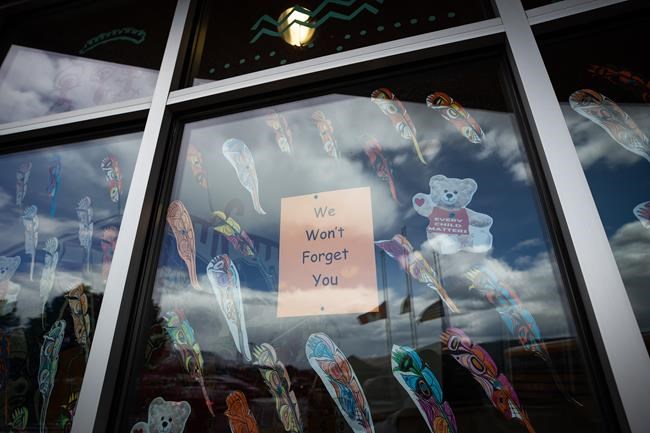First Nation to hold news conference about discovery of ‘hundreds of unmarked graves’
Advertisement
Read this article for free:
or
Already have an account? Log in here »
To continue reading, please subscribe:
Monthly Digital Subscription
$0 for the first 4 weeks*
- Enjoy unlimited reading on winnipegfreepress.com
- Read the E-Edition, our digital replica newspaper
- Access News Break, our award-winning app
- Play interactive puzzles
*No charge for 4 weeks then price increases to the regular rate of $19.00 plus GST every four weeks. Offer available to new and qualified returning subscribers only. Cancel any time.
Monthly Digital Subscription
$4.75/week*
- Enjoy unlimited reading on winnipegfreepress.com
- Read the E-Edition, our digital replica newspaper
- Access News Break, our award-winning app
- Play interactive puzzles
*Billed as $19 plus GST every four weeks. Cancel any time.
To continue reading, please subscribe:
Add Free Press access to your Brandon Sun subscription for only an additional
$1 for the first 4 weeks*
*Your next subscription payment will increase by $1.00 and you will be charged $16.99 plus GST for four weeks. After four weeks, your payment will increase to $23.99 plus GST every four weeks.
Read unlimited articles for free today:
or
Already have an account? Log in here »
Hey there, time traveller!
This article was published 23/06/2021 (1630 days ago), so information in it may no longer be current.
REGINA – A First Nation in southern Saskatchewan is to hold a virtual news conference Thursday morning about what it calls “the horrific and shocking discovery of hundreds of unmarked graves” at the site of a former residential school.
The Cowessess First Nation says the number of unmarked graves at the former Marieval Indian Residential School will be the most substantial to date found in Canada.
The First Nation and the Federation of Sovereign Indigenous Nations say the community and school site about 160 kilometres east of Regina are closed.

They are asking the media to be respectful of survivors, descendants and the communities affected by the discovery.
The National Centre for Truth and Reconciliation says on its website that the Cowessess school was built in 1899 by Roman Catholic missionaries.
Perry Bellegarde, the chief of the Assembly of First Nations, said in a tweet late Wednesday that the finding at Cowessess is “absolutely tragic, but not surprising.”
“I urge all Canadians to stand with First Nations in this extremely difficult and emotional time.”
Premier Scott Moe said all of Saskatchewan mourns for those who were discovered buried in unmarked graves near the former residential school site.
“I understand many were children and it is heartbreaking to think that so many children lost their lives after being separated from their families, and away from the love and solace only a family can provide,” Moe said on Twitter.
“Sadly, other Saskatchewan First Nations will experience the same shock and despair as the search for graves continues across the province.
“We are grateful of the work Indigenous leaders are undertaking and will continue to offer our unwavering support as we work together to help bring closure to survivors, families and communities in our province.”
Moe said he has spoken with Cowessess Chief Cadmus Delorme and Chief Bobby Cameron of the Federation of Sovereign Indigenous Nations to offer the full support of the provincial government as they deal with the tragic discovery.
The federal government began funding the school in 1901 and took over its administration in 1969. The school was turned over to the Cowessess First Nation in 1987, and it was closed 10 years later.
Last month, the Tk’emlups te Secwepemc Nation in British Columbia announced the discovery of what are believed to be the remains of 215 children at the site of the former Kamloops Indian Residential School.
This report by The Canadian Press was first published June 23, 2021


